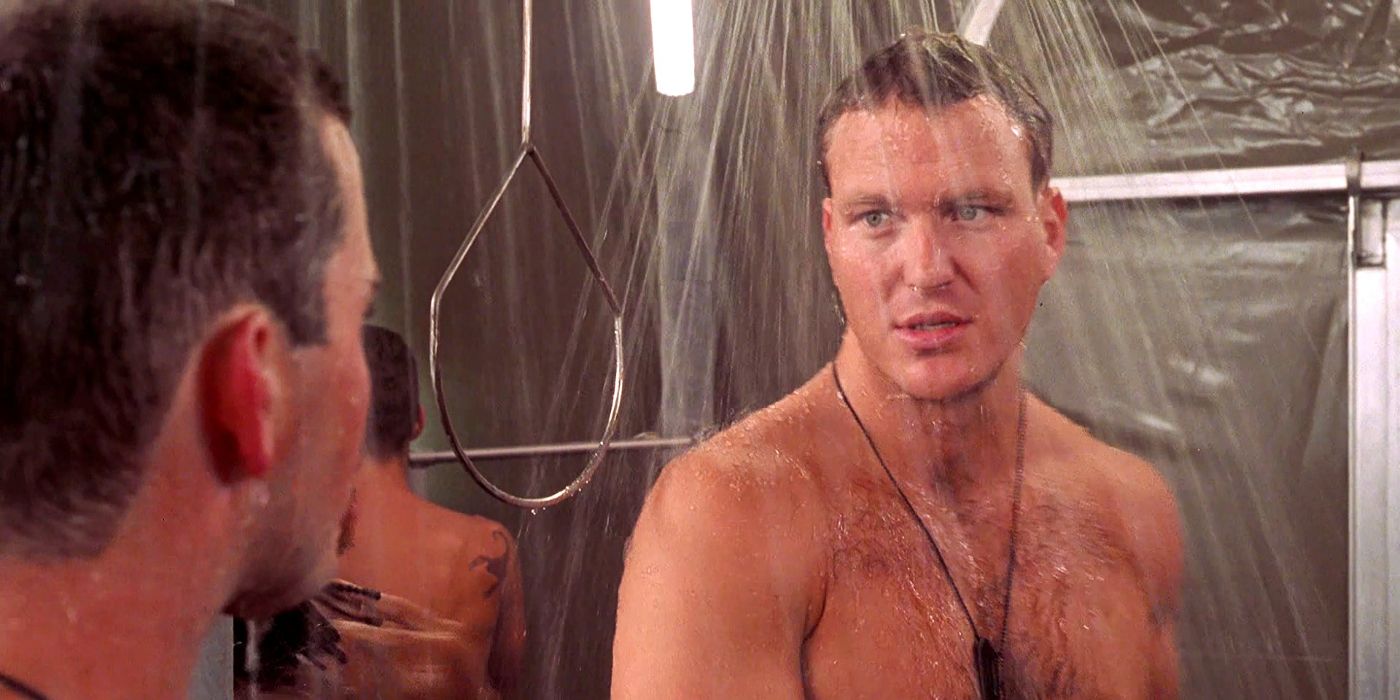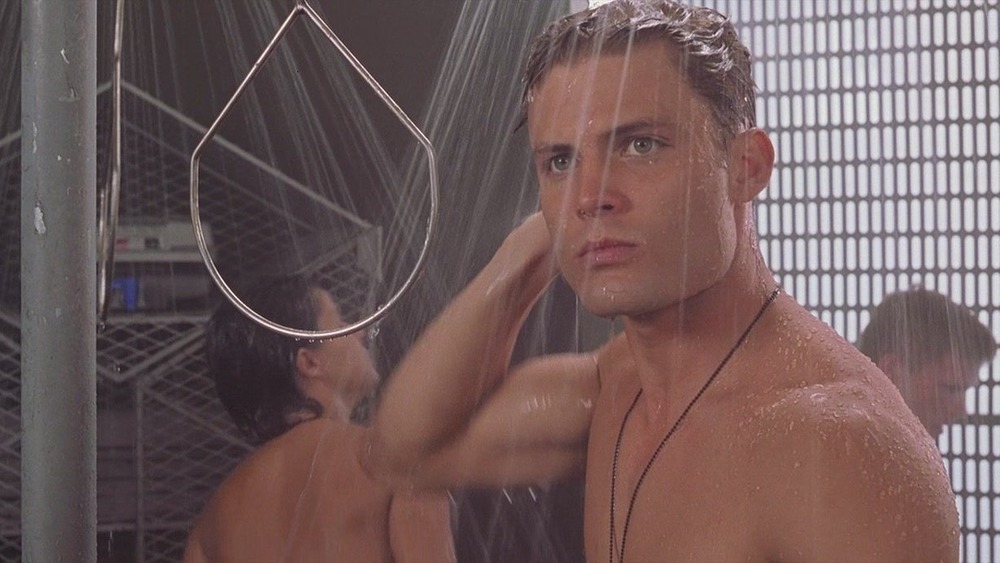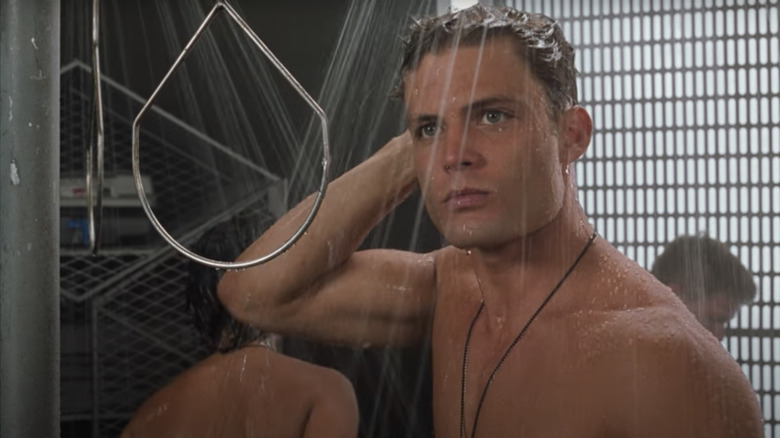The "starship troopers shower" scene, quite simply, holds a spot as one of cinema's truly memorable moments. It is that particular sequence which, for many viewers, captures a core part of what the film is trying to say. This scene, often discussed and sometimes misunderstood, actually offers a lot more than just a fleeting image. It gives us a window into the values and beliefs of a future society, inviting us to really think about what we see. So, you might wonder, why does this specific part of the movie stick with people so much?
For fans of the 1997 sci-fi action movie, this segment is a key piece of the puzzle, a rather clever way to get across some big ideas without outright telling you everything. It shows us characters in a very vulnerable setting, yet they are talking about things that shape their entire lives. This blend of personal openness and public declaration is, in a way, pretty striking. It makes you pause and consider the world these people live in, and how it shapes their choices.
We are, as a matter of fact, going to take a closer look at this famous moment. We will explore what makes it so significant, what the characters reveal about themselves, and how it ties into the larger story of "Starship Troopers." Watch the video to see the starship troopers scene that means more than you think. This is starship troopers part 1 2 by richard wormser on vimeo, the home for high quality videos and the people who love them. It's a scene that keeps people talking, even years after the movie first came out, and that's usually for a very good reason.
Table of Contents
- The Co-Ed Shower: A Societal Glimpse
- Voices from the Ranks: Why They Joined
- Beyond the Surface: Deeper Meanings
- Frequently Asked Questions About the Starship Troopers Shower Scene
The Co-Ed Shower: A Societal Glimpse
The very first thing that often catches a viewer's eye in the "starship troopers shower" scene is the fact that it is co-ed. Men and women are showering together, without any obvious signs of discomfort or privacy concerns. This setup is, in some respects, a rather bold statement about the society depicted in the film. It suggests a world where gender differences, at least in the context of military service, are seen as less important than the collective mission. This visual choice immediately tells us a lot about the values of the United Citizen Federation.
It's not about being shocking for the sake of it; instead, this visual element serves a clear purpose. It shows a society that has, perhaps, moved past certain traditional ideas about modesty or gender roles in public spaces, especially within the military. This communal act of cleaning, stripped of personal barriers, might represent a kind of purity or equality among those who serve. It's almost as if, by shedding their clothes, they also shed their individual identities to become part of something bigger, which is a key theme in the movie.
This setting, too, creates a unique space for conversation. Without the usual distractions or social norms that might govern other interactions, the characters are free to speak openly. This makes their declarations about joining the service feel more authentic, more like genuine thoughts than rehearsed lines. It is, you know, a very clever way to set the stage for what comes next.
Voices from the Ranks: Why They Joined
In the shower scene of Starship Troopers (1997), everyone talks about why they joined the service. This part is really the core of the sequence, offering insight into the motivations of the young recruits. Each character's reason, whether personal or idealistic, builds a picture of the society that encourages such commitment. These brief confessions are, arguably, some of the most telling moments for understanding the film's broader message. They provide a quick snapshot of the different reasons someone might sign up for a military life in this particular future.
Johnny Rico and Dizzy Flores: Early Motivations
Johnny Rico, the main character, joins the military mostly because of a girl, Carmen Ibanez. His initial reason isn't about patriotism or duty; it's a very personal, emotional one. This shows how young and perhaps naive he is at the start, driven by affection rather than a deep understanding of what service truly means. His journey, then, becomes about finding a more profound reason to fight, which is pretty common for characters in stories like this. It's a relatable starting point for a lot of people, you know, doing something for someone else.
Dizzy Flores, on the other hand, joins primarily because of Johnny. She has a strong feeling for him, and her decision to enlist is tied directly to wanting to be near him. Her motivation is also deeply personal, showing how relationships and emotional connections play a big part in these young people's choices. This highlights a different kind of loyalty, one that starts with a person and might, perhaps, grow into something larger. It's a rather poignant reason, in a way, to sign up for such a tough life.
Carmen Ibanez: A Path to the Stars
Carmen Ibanez, the object of Johnny's affection, has a different kind of ambition. She wants to become a pilot, to fly starships, and to explore the vastness of space. For her, the military is a path to achieving a specific career goal, a way to reach for the stars, literally. Her motivation is more about personal aspiration and professional development than emotional ties or abstract ideals. This shows that the service offers different kinds of opportunities, not just combat roles, which is, you know, a pretty important detail for understanding the world they live in. It's a very practical choice, in some respects.
Her desire to fly represents a sense of adventure and a longing for something beyond the ordinary. The military, in this future, seems to be the main avenue for such high-tech, specialized careers. This makes her choice seem very logical within the context of their society. It's almost as if the military acts as a kind of university or vocational school for highly specialized roles, which is, actually, a fascinating aspect of their social structure. She's looking for a future that's, like, bigger than herself.
Busey's Blunt Truth: A Career Choice
When it's Busey's turn, he says he wants a career. This line, simple and direct, stands out precisely because it lacks the emotional or idealistic undertones of the others. While Johnny, Dizzy, and Carmen speak of love, ambition, or a desire for exploration, Busey's motivation is purely practical: he seeks a stable job, a future with purpose and perhaps, you know, a pension. This very straightforward answer cuts through some of the romantic notions about military service that the film, arguably, both promotes and critiques. It's a rather grounded reason, showing a different side of enlistment.
In a 2018 interview with, the actor who played Busey might have offered more insight into this character's perspective. This detail from "My text" suggests that even the creators or actors themselves recognized the unique weight of Busey's line. It highlights that for some, military service is simply a viable path to employment and stability in a world where civilian opportunities might be limited or less appealing. This makes his character, in a way, very relatable to people who join up for practical reasons. It's, like, a very honest answer.
His statement serves as a stark contrast to the more emotionally charged reasons given by his peers. It grounds the scene in a kind of gritty realism, reminding us that not everyone is driven by grand ideals. Sometimes, a person just wants a steady job and a place in the world, which is, you know, a perfectly valid reason for joining any organization. This simple declaration, perhaps, speaks volumes about the economic realities or perceived benefits of military life in their society. It's, basically, a very practical outlook.
Beyond the Surface: Deeper Meanings
The "starship troopers shower" scene is more than just a collection of personal confessions; it's a microcosm of the film's larger themes. It uses the intimate setting to explore big ideas about society, citizenship, and the nature of war. The scene, quite simply, functions as a powerful piece of social commentary, making you think about the messages being sent. It's, in a way, a very smart piece of filmmaking that keeps on giving.
Citizenship and Sacrifice
In the world of "Starship Troopers," full citizenship is earned through military service. The shower scene subtly reinforces this concept. By showing these young people openly declaring their reasons for joining, it highlights the social expectation and, perhaps, the perceived necessity of service to gain full rights and privileges. This connection between service and citizenship is, in some respects, a core tenet of their society, and the scene drives that point home. It's almost as if, by joining, they are truly becoming part of the adult world.
The willingness to sacrifice, even if initially driven by personal motives, is a key element here. The act of enlisting, particularly in a future where bugs are a constant threat, implies an acceptance of risk and a readiness to give up one's life for the collective. This scene, therefore, sets up the idea that true belonging comes with a price. It's a rather stark message about what their society values most. You know, it really makes you think about what citizenship means.
Propaganda and Conformity
The open, almost rehearsed nature of the confessions in the shower scene can also be viewed through the lens of propaganda. The society in "Starship Troopers" is heavily militarized, with pervasive media constantly promoting service and patriotism. The ease with which these young people articulate their reasons, even the personal ones, might suggest a degree of indoctrination. It's almost as if they are echoing what they've been taught is the right way to think about service. This is, in a way, a very subtle critique of how ideas can be shaped.
The lack of privacy in the co-ed shower also speaks to a culture of conformity. Personal boundaries seem to be less important than group cohesion and transparency. This environment, where everyone is literally exposed, encourages a collective identity over individual expression. This can be seen as a tool for fostering unity and discouraging dissent, which is, quite simply, a hallmark of a society that values collective action above all else. It's, like, a very effective way to make everyone feel the same.
The Human Element in a Harsh World
Despite the underlying themes of propaganda and conformity, the "starship troopers shower" scene also manages to retain a powerful human element. The vulnerability of the characters, both physically and emotionally, as they share their motivations, creates a sense of connection. We see them as young people with hopes, dreams, and fears, not just as cogs in a military machine. This makes their eventual experiences in combat, you know, even more impactful. It's a rather clever way to make you care about them.
The scene, in a way, reminds us that even in a highly controlled or ideological society, individual desires and relationships still play a part in people's choices. It shows that while the system might push people towards certain paths, their personal reasons for walking those paths are still very much their own. This blend of individual motivation within a collective framework is, actually, what makes the scene so enduring and thought-provoking. It's, basically, a very human moment in a very strange setting. Learn more about on our site, and link to this page . You can also watch the full clip on Vimeo to see it for yourself.
Frequently Asked Questions About the Starship Troopers Shower Scene
Why is the shower scene in Starship Troopers so famous?
The scene is famous because it's rather unusual to see a co-ed shower in a mainstream movie, especially one where characters are having serious discussions. It's, you know, a very bold visual choice that immediately gets people talking and questioning the society depicted in the film. It's also quite effective at showing the film's themes without a lot of talking.
What was said in the Starship Troopers shower scene?
In the scene, various recruits, including Johnny Rico, Dizzy Flores, Carmen Ibanez, and Busey, take turns explaining why they joined the military. Their reasons range from personal affections and career ambitions to a desire for stability, which is, you know, quite a mix of motivations. When it's Busey's turn he says he wants a career.
What does the Starship Troopers shower scene represent?
The scene represents several things: the egalitarian nature of military service in their society, the influence of propaganda on individual choices, and the varied personal motivations that drive people to enlist. It's, in a way, a very concentrated look at the film's core ideas about citizenship and collective identity. It really shows how their world works.



